114.241 Principles of HRM: Expatriate Assignment Success Strategies
VerifiedAdded on 2023/04/22
|9
|2704
|249
Essay
AI Summary
This essay examines the crucial role of Human Resource Management (HRM) practices in ensuring the success of expatriate assignments. It begins by highlighting the challenges inherent in international assignments, particularly those involving significant cultural differences. The essay then delves into specific HRM areas critical for success, including cross-cultural training and language acquisition to facilitate adaptation and communication. It emphasizes the importance of proper employee selection, focusing on open-mindedness and adaptability, and the provision of security training to address global risks. The essay further discusses the significance of performance evaluation, compensation and reward systems, and employee support throughout the assignment. These practices are shown to be essential for managing employee expectations, facilitating career development, and fostering a positive environment that enhances productivity and overall assignment success. The essay concludes by reiterating the importance of a holistic HRM approach in mitigating risks and maximizing the benefits of expatriate assignments.
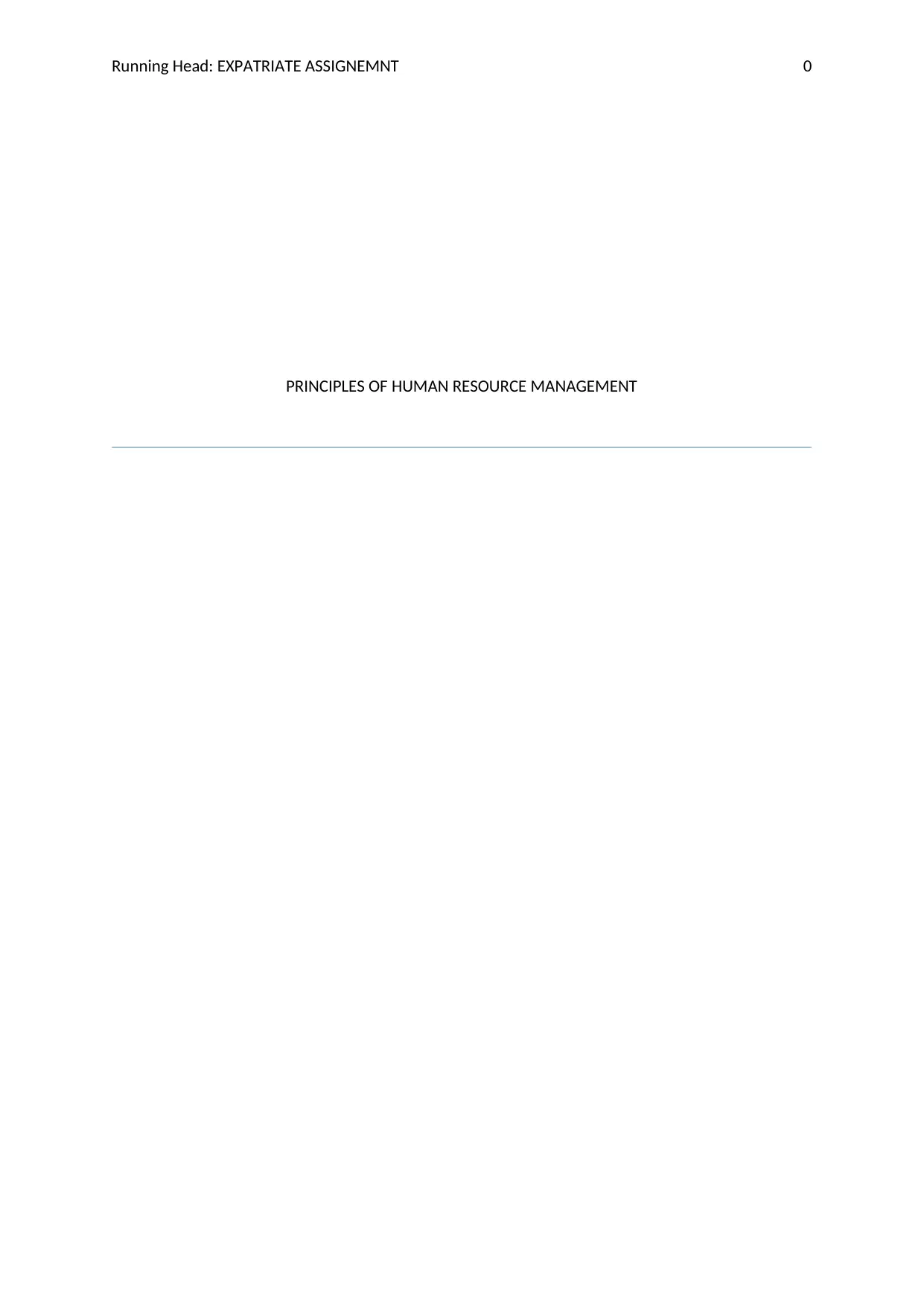
Running Head: EXPATRIATE ASSIGNEMNT 0
PRINCIPLES OF HUMAN RESOURCE MANAGEMENT
PRINCIPLES OF HUMAN RESOURCE MANAGEMENT
Paraphrase This Document
Need a fresh take? Get an instant paraphrase of this document with our AI Paraphraser

EXPATRIATE ASSIGNEMNT 1
Table of Contents
Introduction...........................................................................................................................................2
HRM practices for ensuring the success of expatriate assignments......................................................2
Conclusion.............................................................................................................................................6
References.............................................................................................................................................7
Table of Contents
Introduction...........................................................................................................................................2
HRM practices for ensuring the success of expatriate assignments......................................................2
Conclusion.............................................................................................................................................6
References.............................................................................................................................................7
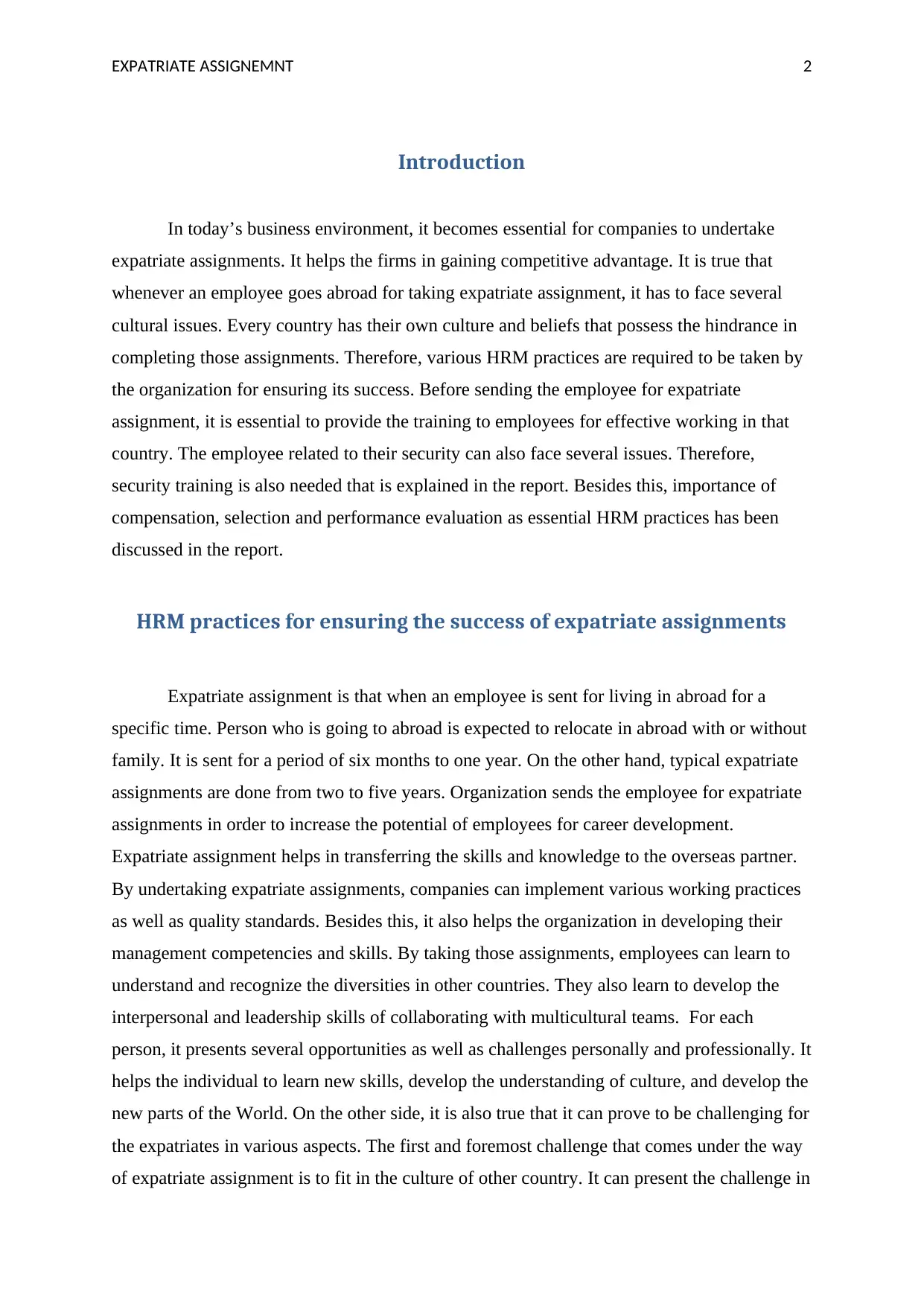
EXPATRIATE ASSIGNEMNT 2
Introduction
In today’s business environment, it becomes essential for companies to undertake
expatriate assignments. It helps the firms in gaining competitive advantage. It is true that
whenever an employee goes abroad for taking expatriate assignment, it has to face several
cultural issues. Every country has their own culture and beliefs that possess the hindrance in
completing those assignments. Therefore, various HRM practices are required to be taken by
the organization for ensuring its success. Before sending the employee for expatriate
assignment, it is essential to provide the training to employees for effective working in that
country. The employee related to their security can also face several issues. Therefore,
security training is also needed that is explained in the report. Besides this, importance of
compensation, selection and performance evaluation as essential HRM practices has been
discussed in the report.
HRM practices for ensuring the success of expatriate assignments
Expatriate assignment is that when an employee is sent for living in abroad for a
specific time. Person who is going to abroad is expected to relocate in abroad with or without
family. It is sent for a period of six months to one year. On the other hand, typical expatriate
assignments are done from two to five years. Organization sends the employee for expatriate
assignments in order to increase the potential of employees for career development.
Expatriate assignment helps in transferring the skills and knowledge to the overseas partner.
By undertaking expatriate assignments, companies can implement various working practices
as well as quality standards. Besides this, it also helps the organization in developing their
management competencies and skills. By taking those assignments, employees can learn to
understand and recognize the diversities in other countries. They also learn to develop the
interpersonal and leadership skills of collaborating with multicultural teams. For each
person, it presents several opportunities as well as challenges personally and professionally. It
helps the individual to learn new skills, develop the understanding of culture, and develop the
new parts of the World. On the other side, it is also true that it can prove to be challenging for
the expatriates in various aspects. The first and foremost challenge that comes under the way
of expatriate assignment is to fit in the culture of other country. It can present the challenge in
Introduction
In today’s business environment, it becomes essential for companies to undertake
expatriate assignments. It helps the firms in gaining competitive advantage. It is true that
whenever an employee goes abroad for taking expatriate assignment, it has to face several
cultural issues. Every country has their own culture and beliefs that possess the hindrance in
completing those assignments. Therefore, various HRM practices are required to be taken by
the organization for ensuring its success. Before sending the employee for expatriate
assignment, it is essential to provide the training to employees for effective working in that
country. The employee related to their security can also face several issues. Therefore,
security training is also needed that is explained in the report. Besides this, importance of
compensation, selection and performance evaluation as essential HRM practices has been
discussed in the report.
HRM practices for ensuring the success of expatriate assignments
Expatriate assignment is that when an employee is sent for living in abroad for a
specific time. Person who is going to abroad is expected to relocate in abroad with or without
family. It is sent for a period of six months to one year. On the other hand, typical expatriate
assignments are done from two to five years. Organization sends the employee for expatriate
assignments in order to increase the potential of employees for career development.
Expatriate assignment helps in transferring the skills and knowledge to the overseas partner.
By undertaking expatriate assignments, companies can implement various working practices
as well as quality standards. Besides this, it also helps the organization in developing their
management competencies and skills. By taking those assignments, employees can learn to
understand and recognize the diversities in other countries. They also learn to develop the
interpersonal and leadership skills of collaborating with multicultural teams. For each
person, it presents several opportunities as well as challenges personally and professionally. It
helps the individual to learn new skills, develop the understanding of culture, and develop the
new parts of the World. On the other side, it is also true that it can prove to be challenging for
the expatriates in various aspects. The first and foremost challenge that comes under the way
of expatriate assignment is to fit in the culture of other country. It can present the challenge in
⊘ This is a preview!⊘
Do you want full access?
Subscribe today to unlock all pages.

Trusted by 1+ million students worldwide
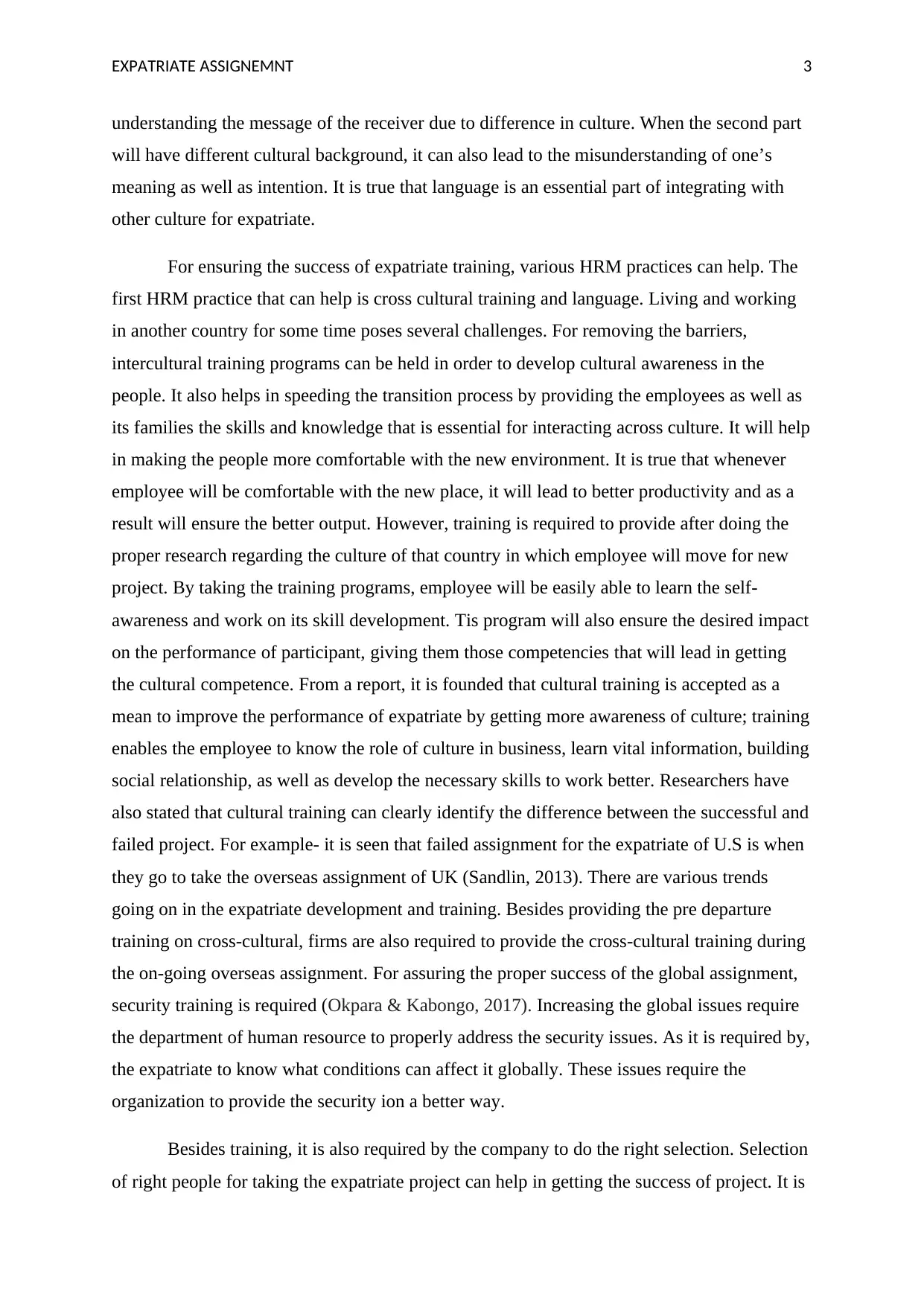
EXPATRIATE ASSIGNEMNT 3
understanding the message of the receiver due to difference in culture. When the second part
will have different cultural background, it can also lead to the misunderstanding of one’s
meaning as well as intention. It is true that language is an essential part of integrating with
other culture for expatriate.
For ensuring the success of expatriate training, various HRM practices can help. The
first HRM practice that can help is cross cultural training and language. Living and working
in another country for some time poses several challenges. For removing the barriers,
intercultural training programs can be held in order to develop cultural awareness in the
people. It also helps in speeding the transition process by providing the employees as well as
its families the skills and knowledge that is essential for interacting across culture. It will help
in making the people more comfortable with the new environment. It is true that whenever
employee will be comfortable with the new place, it will lead to better productivity and as a
result will ensure the better output. However, training is required to provide after doing the
proper research regarding the culture of that country in which employee will move for new
project. By taking the training programs, employee will be easily able to learn the self-
awareness and work on its skill development. Tis program will also ensure the desired impact
on the performance of participant, giving them those competencies that will lead in getting
the cultural competence. From a report, it is founded that cultural training is accepted as a
mean to improve the performance of expatriate by getting more awareness of culture; training
enables the employee to know the role of culture in business, learn vital information, building
social relationship, as well as develop the necessary skills to work better. Researchers have
also stated that cultural training can clearly identify the difference between the successful and
failed project. For example- it is seen that failed assignment for the expatriate of U.S is when
they go to take the overseas assignment of UK (Sandlin, 2013). There are various trends
going on in the expatriate development and training. Besides providing the pre departure
training on cross-cultural, firms are also required to provide the cross-cultural training during
the on-going overseas assignment. For assuring the proper success of the global assignment,
security training is required (Okpara & Kabongo, 2017). Increasing the global issues require
the department of human resource to properly address the security issues. As it is required by,
the expatriate to know what conditions can affect it globally. These issues require the
organization to provide the security ion a better way.
Besides training, it is also required by the company to do the right selection. Selection
of right people for taking the expatriate project can help in getting the success of project. It is
understanding the message of the receiver due to difference in culture. When the second part
will have different cultural background, it can also lead to the misunderstanding of one’s
meaning as well as intention. It is true that language is an essential part of integrating with
other culture for expatriate.
For ensuring the success of expatriate training, various HRM practices can help. The
first HRM practice that can help is cross cultural training and language. Living and working
in another country for some time poses several challenges. For removing the barriers,
intercultural training programs can be held in order to develop cultural awareness in the
people. It also helps in speeding the transition process by providing the employees as well as
its families the skills and knowledge that is essential for interacting across culture. It will help
in making the people more comfortable with the new environment. It is true that whenever
employee will be comfortable with the new place, it will lead to better productivity and as a
result will ensure the better output. However, training is required to provide after doing the
proper research regarding the culture of that country in which employee will move for new
project. By taking the training programs, employee will be easily able to learn the self-
awareness and work on its skill development. Tis program will also ensure the desired impact
on the performance of participant, giving them those competencies that will lead in getting
the cultural competence. From a report, it is founded that cultural training is accepted as a
mean to improve the performance of expatriate by getting more awareness of culture; training
enables the employee to know the role of culture in business, learn vital information, building
social relationship, as well as develop the necessary skills to work better. Researchers have
also stated that cultural training can clearly identify the difference between the successful and
failed project. For example- it is seen that failed assignment for the expatriate of U.S is when
they go to take the overseas assignment of UK (Sandlin, 2013). There are various trends
going on in the expatriate development and training. Besides providing the pre departure
training on cross-cultural, firms are also required to provide the cross-cultural training during
the on-going overseas assignment. For assuring the proper success of the global assignment,
security training is required (Okpara & Kabongo, 2017). Increasing the global issues require
the department of human resource to properly address the security issues. As it is required by,
the expatriate to know what conditions can affect it globally. These issues require the
organization to provide the security ion a better way.
Besides training, it is also required by the company to do the right selection. Selection
of right people for taking the expatriate project can help in getting the success of project. It is
Paraphrase This Document
Need a fresh take? Get an instant paraphrase of this document with our AI Paraphraser
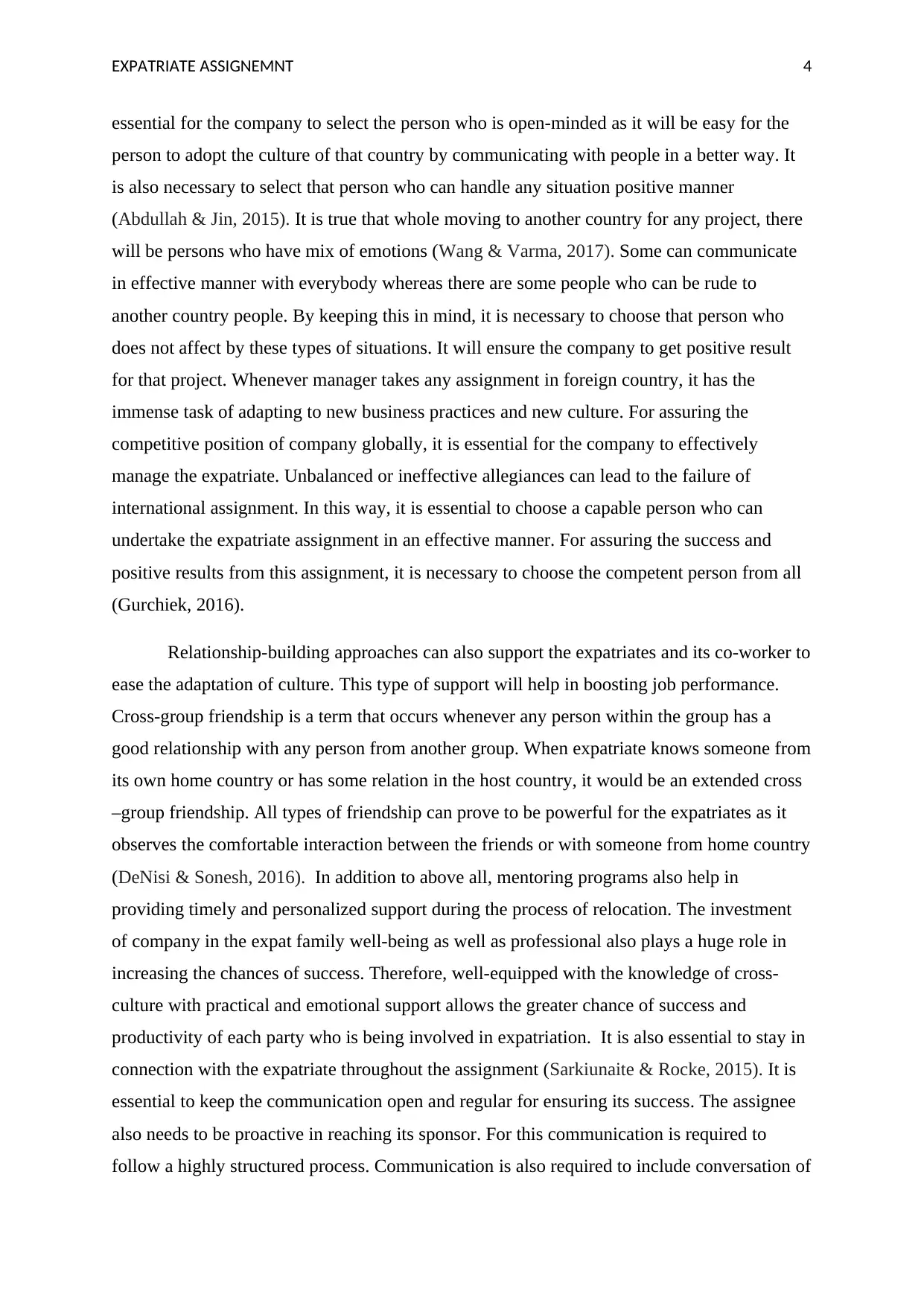
EXPATRIATE ASSIGNEMNT 4
essential for the company to select the person who is open-minded as it will be easy for the
person to adopt the culture of that country by communicating with people in a better way. It
is also necessary to select that person who can handle any situation positive manner
(Abdullah & Jin, 2015). It is true that whole moving to another country for any project, there
will be persons who have mix of emotions (Wang & Varma, 2017). Some can communicate
in effective manner with everybody whereas there are some people who can be rude to
another country people. By keeping this in mind, it is necessary to choose that person who
does not affect by these types of situations. It will ensure the company to get positive result
for that project. Whenever manager takes any assignment in foreign country, it has the
immense task of adapting to new business practices and new culture. For assuring the
competitive position of company globally, it is essential for the company to effectively
manage the expatriate. Unbalanced or ineffective allegiances can lead to the failure of
international assignment. In this way, it is essential to choose a capable person who can
undertake the expatriate assignment in an effective manner. For assuring the success and
positive results from this assignment, it is necessary to choose the competent person from all
(Gurchiek, 2016).
Relationship-building approaches can also support the expatriates and its co-worker to
ease the adaptation of culture. This type of support will help in boosting job performance.
Cross-group friendship is a term that occurs whenever any person within the group has a
good relationship with any person from another group. When expatriate knows someone from
its own home country or has some relation in the host country, it would be an extended cross
–group friendship. All types of friendship can prove to be powerful for the expatriates as it
observes the comfortable interaction between the friends or with someone from home country
(DeNisi & Sonesh, 2016). In addition to above all, mentoring programs also help in
providing timely and personalized support during the process of relocation. The investment
of company in the expat family well-being as well as professional also plays a huge role in
increasing the chances of success. Therefore, well-equipped with the knowledge of cross-
culture with practical and emotional support allows the greater chance of success and
productivity of each party who is being involved in expatriation. It is also essential to stay in
connection with the expatriate throughout the assignment (Sarkiunaite & Rocke, 2015). It is
essential to keep the communication open and regular for ensuring its success. The assignee
also needs to be proactive in reaching its sponsor. For this communication is required to
follow a highly structured process. Communication is also required to include conversation of
essential for the company to select the person who is open-minded as it will be easy for the
person to adopt the culture of that country by communicating with people in a better way. It
is also necessary to select that person who can handle any situation positive manner
(Abdullah & Jin, 2015). It is true that whole moving to another country for any project, there
will be persons who have mix of emotions (Wang & Varma, 2017). Some can communicate
in effective manner with everybody whereas there are some people who can be rude to
another country people. By keeping this in mind, it is necessary to choose that person who
does not affect by these types of situations. It will ensure the company to get positive result
for that project. Whenever manager takes any assignment in foreign country, it has the
immense task of adapting to new business practices and new culture. For assuring the
competitive position of company globally, it is essential for the company to effectively
manage the expatriate. Unbalanced or ineffective allegiances can lead to the failure of
international assignment. In this way, it is essential to choose a capable person who can
undertake the expatriate assignment in an effective manner. For assuring the success and
positive results from this assignment, it is necessary to choose the competent person from all
(Gurchiek, 2016).
Relationship-building approaches can also support the expatriates and its co-worker to
ease the adaptation of culture. This type of support will help in boosting job performance.
Cross-group friendship is a term that occurs whenever any person within the group has a
good relationship with any person from another group. When expatriate knows someone from
its own home country or has some relation in the host country, it would be an extended cross
–group friendship. All types of friendship can prove to be powerful for the expatriates as it
observes the comfortable interaction between the friends or with someone from home country
(DeNisi & Sonesh, 2016). In addition to above all, mentoring programs also help in
providing timely and personalized support during the process of relocation. The investment
of company in the expat family well-being as well as professional also plays a huge role in
increasing the chances of success. Therefore, well-equipped with the knowledge of cross-
culture with practical and emotional support allows the greater chance of success and
productivity of each party who is being involved in expatriation. It is also essential to stay in
connection with the expatriate throughout the assignment (Sarkiunaite & Rocke, 2015). It is
essential to keep the communication open and regular for ensuring its success. The assignee
also needs to be proactive in reaching its sponsor. For this communication is required to
follow a highly structured process. Communication is also required to include conversation of
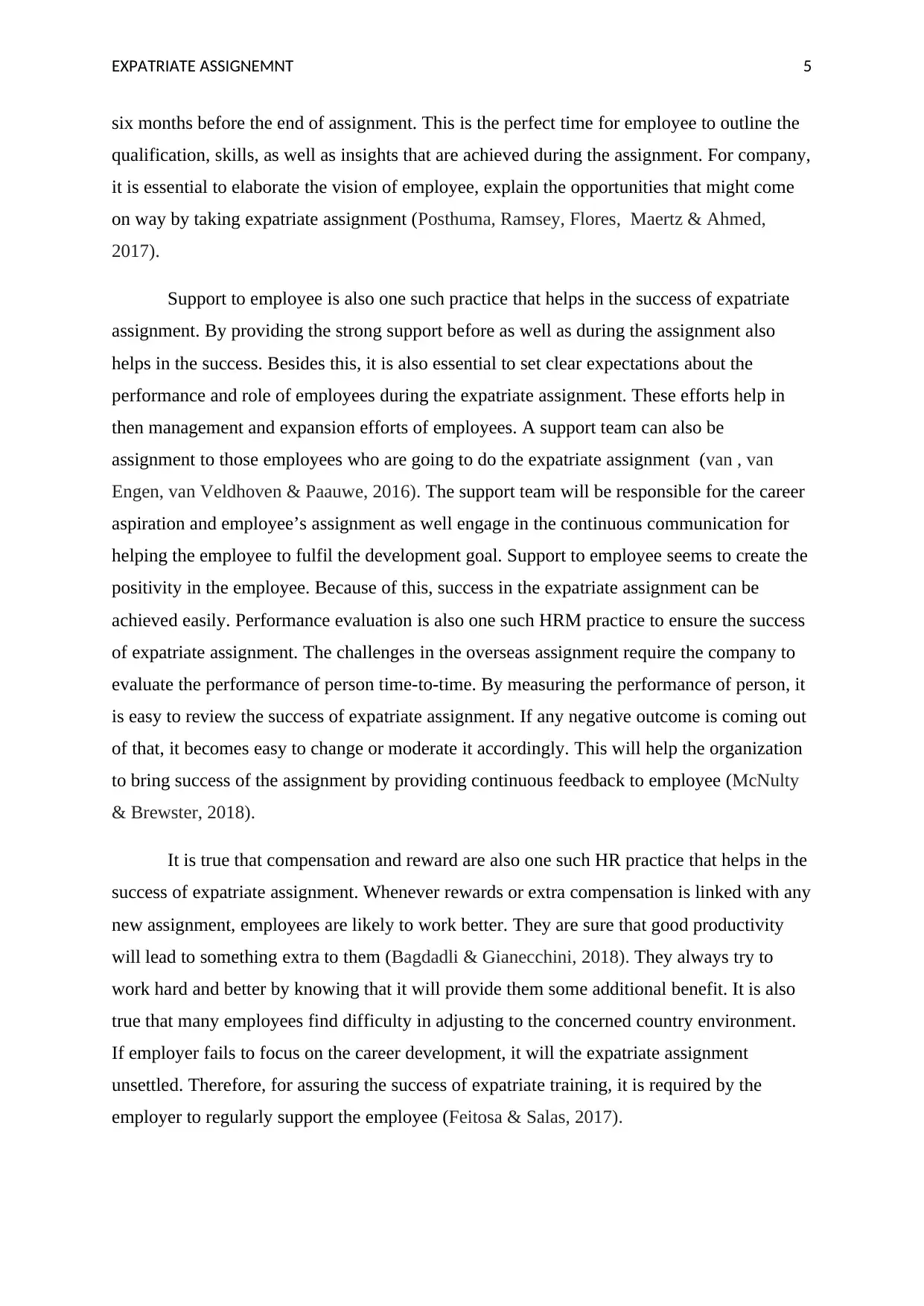
EXPATRIATE ASSIGNEMNT 5
six months before the end of assignment. This is the perfect time for employee to outline the
qualification, skills, as well as insights that are achieved during the assignment. For company,
it is essential to elaborate the vision of employee, explain the opportunities that might come
on way by taking expatriate assignment (Posthuma, Ramsey, Flores, Maertz & Ahmed,
2017).
Support to employee is also one such practice that helps in the success of expatriate
assignment. By providing the strong support before as well as during the assignment also
helps in the success. Besides this, it is also essential to set clear expectations about the
performance and role of employees during the expatriate assignment. These efforts help in
then management and expansion efforts of employees. A support team can also be
assignment to those employees who are going to do the expatriate assignment (van , van
Engen, van Veldhoven & Paauwe, 2016). The support team will be responsible for the career
aspiration and employee’s assignment as well engage in the continuous communication for
helping the employee to fulfil the development goal. Support to employee seems to create the
positivity in the employee. Because of this, success in the expatriate assignment can be
achieved easily. Performance evaluation is also one such HRM practice to ensure the success
of expatriate assignment. The challenges in the overseas assignment require the company to
evaluate the performance of person time-to-time. By measuring the performance of person, it
is easy to review the success of expatriate assignment. If any negative outcome is coming out
of that, it becomes easy to change or moderate it accordingly. This will help the organization
to bring success of the assignment by providing continuous feedback to employee (McNulty
& Brewster, 2018).
It is true that compensation and reward are also one such HR practice that helps in the
success of expatriate assignment. Whenever rewards or extra compensation is linked with any
new assignment, employees are likely to work better. They are sure that good productivity
will lead to something extra to them (Bagdadli & Gianecchini, 2018). They always try to
work hard and better by knowing that it will provide them some additional benefit. It is also
true that many employees find difficulty in adjusting to the concerned country environment.
If employer fails to focus on the career development, it will the expatriate assignment
unsettled. Therefore, for assuring the success of expatriate training, it is required by the
employer to regularly support the employee (Feitosa & Salas, 2017).
six months before the end of assignment. This is the perfect time for employee to outline the
qualification, skills, as well as insights that are achieved during the assignment. For company,
it is essential to elaborate the vision of employee, explain the opportunities that might come
on way by taking expatriate assignment (Posthuma, Ramsey, Flores, Maertz & Ahmed,
2017).
Support to employee is also one such practice that helps in the success of expatriate
assignment. By providing the strong support before as well as during the assignment also
helps in the success. Besides this, it is also essential to set clear expectations about the
performance and role of employees during the expatriate assignment. These efforts help in
then management and expansion efforts of employees. A support team can also be
assignment to those employees who are going to do the expatriate assignment (van , van
Engen, van Veldhoven & Paauwe, 2016). The support team will be responsible for the career
aspiration and employee’s assignment as well engage in the continuous communication for
helping the employee to fulfil the development goal. Support to employee seems to create the
positivity in the employee. Because of this, success in the expatriate assignment can be
achieved easily. Performance evaluation is also one such HRM practice to ensure the success
of expatriate assignment. The challenges in the overseas assignment require the company to
evaluate the performance of person time-to-time. By measuring the performance of person, it
is easy to review the success of expatriate assignment. If any negative outcome is coming out
of that, it becomes easy to change or moderate it accordingly. This will help the organization
to bring success of the assignment by providing continuous feedback to employee (McNulty
& Brewster, 2018).
It is true that compensation and reward are also one such HR practice that helps in the
success of expatriate assignment. Whenever rewards or extra compensation is linked with any
new assignment, employees are likely to work better. They are sure that good productivity
will lead to something extra to them (Bagdadli & Gianecchini, 2018). They always try to
work hard and better by knowing that it will provide them some additional benefit. It is also
true that many employees find difficulty in adjusting to the concerned country environment.
If employer fails to focus on the career development, it will the expatriate assignment
unsettled. Therefore, for assuring the success of expatriate training, it is required by the
employer to regularly support the employee (Feitosa & Salas, 2017).
⊘ This is a preview!⊘
Do you want full access?
Subscribe today to unlock all pages.

Trusted by 1+ million students worldwide
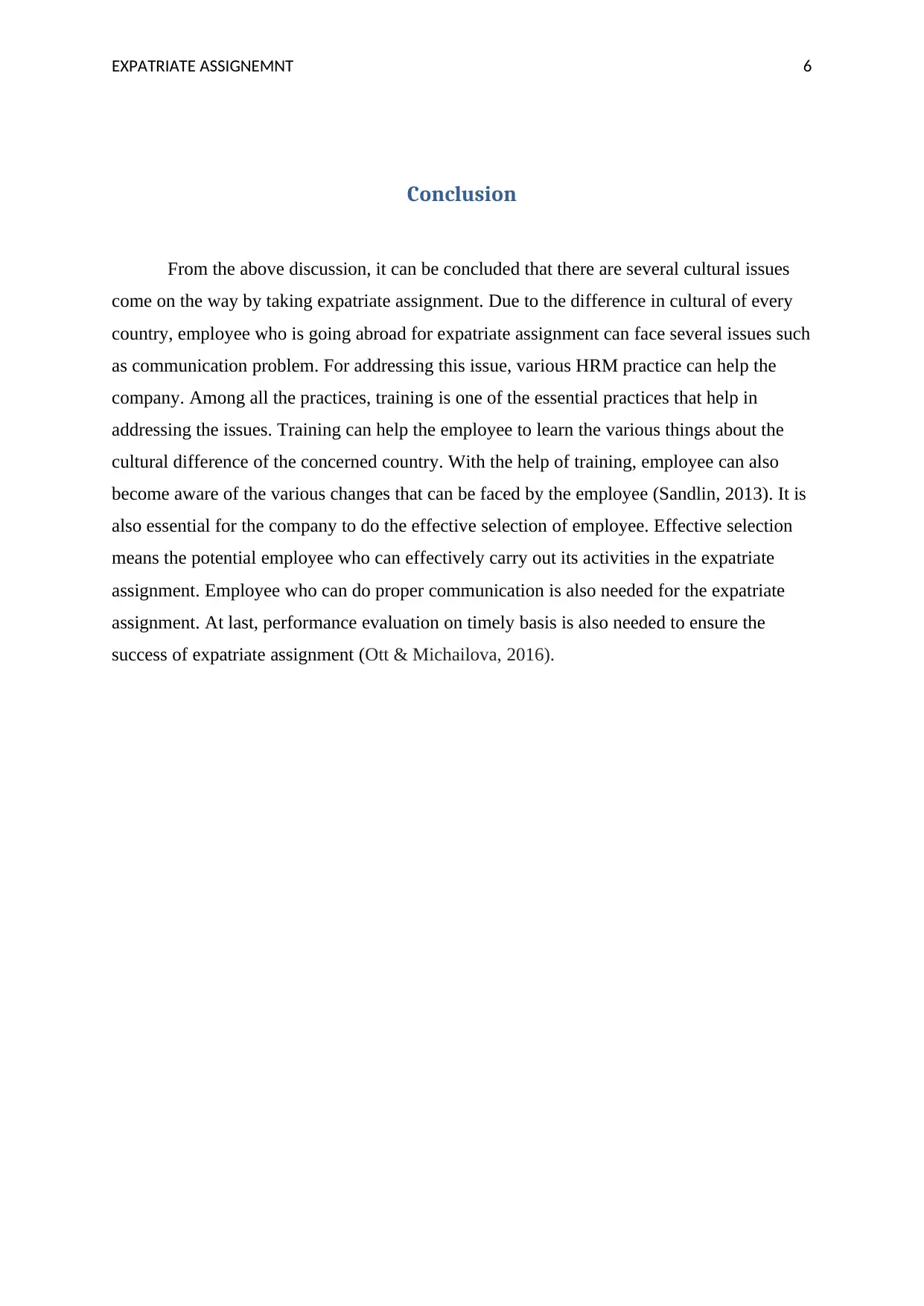
EXPATRIATE ASSIGNEMNT 6
Conclusion
From the above discussion, it can be concluded that there are several cultural issues
come on the way by taking expatriate assignment. Due to the difference in cultural of every
country, employee who is going abroad for expatriate assignment can face several issues such
as communication problem. For addressing this issue, various HRM practice can help the
company. Among all the practices, training is one of the essential practices that help in
addressing the issues. Training can help the employee to learn the various things about the
cultural difference of the concerned country. With the help of training, employee can also
become aware of the various changes that can be faced by the employee (Sandlin, 2013). It is
also essential for the company to do the effective selection of employee. Effective selection
means the potential employee who can effectively carry out its activities in the expatriate
assignment. Employee who can do proper communication is also needed for the expatriate
assignment. At last, performance evaluation on timely basis is also needed to ensure the
success of expatriate assignment (Ott & Michailova, 2016).
Conclusion
From the above discussion, it can be concluded that there are several cultural issues
come on the way by taking expatriate assignment. Due to the difference in cultural of every
country, employee who is going abroad for expatriate assignment can face several issues such
as communication problem. For addressing this issue, various HRM practice can help the
company. Among all the practices, training is one of the essential practices that help in
addressing the issues. Training can help the employee to learn the various things about the
cultural difference of the concerned country. With the help of training, employee can also
become aware of the various changes that can be faced by the employee (Sandlin, 2013). It is
also essential for the company to do the effective selection of employee. Effective selection
means the potential employee who can effectively carry out its activities in the expatriate
assignment. Employee who can do proper communication is also needed for the expatriate
assignment. At last, performance evaluation on timely basis is also needed to ensure the
success of expatriate assignment (Ott & Michailova, 2016).
Paraphrase This Document
Need a fresh take? Get an instant paraphrase of this document with our AI Paraphraser
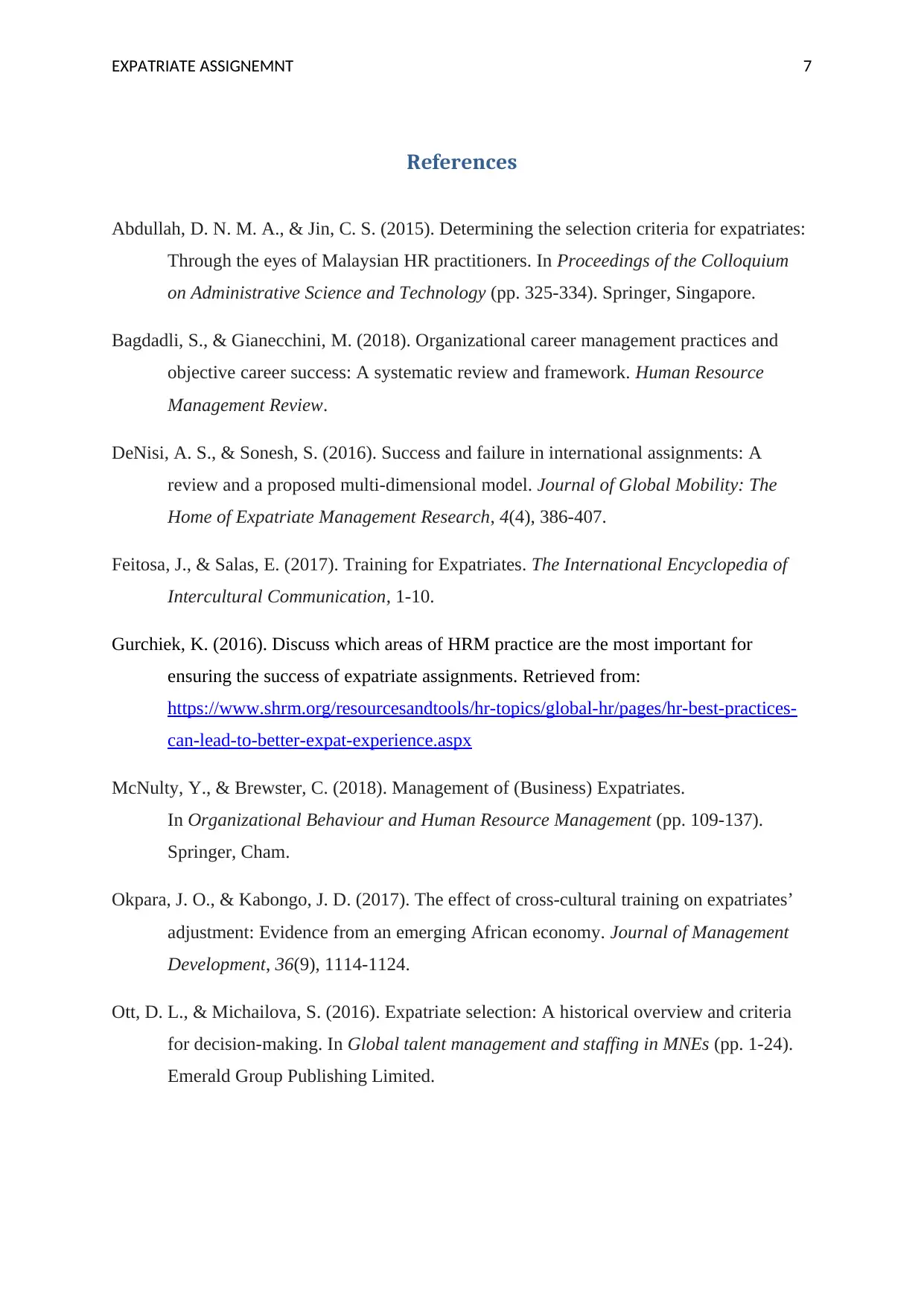
EXPATRIATE ASSIGNEMNT 7
References
Abdullah, D. N. M. A., & Jin, C. S. (2015). Determining the selection criteria for expatriates:
Through the eyes of Malaysian HR practitioners. In Proceedings of the Colloquium
on Administrative Science and Technology (pp. 325-334). Springer, Singapore.
Bagdadli, S., & Gianecchini, M. (2018). Organizational career management practices and
objective career success: A systematic review and framework. Human Resource
Management Review.
DeNisi, A. S., & Sonesh, S. (2016). Success and failure in international assignments: A
review and a proposed multi-dimensional model. Journal of Global Mobility: The
Home of Expatriate Management Research, 4(4), 386-407.
Feitosa, J., & Salas, E. (2017). Training for Expatriates. The International Encyclopedia of
Intercultural Communication, 1-10.
Gurchiek, K. (2016). Discuss which areas of HRM practice are the most important for
ensuring the success of expatriate assignments. Retrieved from:
https://www.shrm.org/resourcesandtools/hr-topics/global-hr/pages/hr-best-practices-
can-lead-to-better-expat-experience.aspx
McNulty, Y., & Brewster, C. (2018). Management of (Business) Expatriates.
In Organizational Behaviour and Human Resource Management (pp. 109-137).
Springer, Cham.
Okpara, J. O., & Kabongo, J. D. (2017). The effect of cross-cultural training on expatriates’
adjustment: Evidence from an emerging African economy. Journal of Management
Development, 36(9), 1114-1124.
Ott, D. L., & Michailova, S. (2016). Expatriate selection: A historical overview and criteria
for decision-making. In Global talent management and staffing in MNEs (pp. 1-24).
Emerald Group Publishing Limited.
References
Abdullah, D. N. M. A., & Jin, C. S. (2015). Determining the selection criteria for expatriates:
Through the eyes of Malaysian HR practitioners. In Proceedings of the Colloquium
on Administrative Science and Technology (pp. 325-334). Springer, Singapore.
Bagdadli, S., & Gianecchini, M. (2018). Organizational career management practices and
objective career success: A systematic review and framework. Human Resource
Management Review.
DeNisi, A. S., & Sonesh, S. (2016). Success and failure in international assignments: A
review and a proposed multi-dimensional model. Journal of Global Mobility: The
Home of Expatriate Management Research, 4(4), 386-407.
Feitosa, J., & Salas, E. (2017). Training for Expatriates. The International Encyclopedia of
Intercultural Communication, 1-10.
Gurchiek, K. (2016). Discuss which areas of HRM practice are the most important for
ensuring the success of expatriate assignments. Retrieved from:
https://www.shrm.org/resourcesandtools/hr-topics/global-hr/pages/hr-best-practices-
can-lead-to-better-expat-experience.aspx
McNulty, Y., & Brewster, C. (2018). Management of (Business) Expatriates.
In Organizational Behaviour and Human Resource Management (pp. 109-137).
Springer, Cham.
Okpara, J. O., & Kabongo, J. D. (2017). The effect of cross-cultural training on expatriates’
adjustment: Evidence from an emerging African economy. Journal of Management
Development, 36(9), 1114-1124.
Ott, D. L., & Michailova, S. (2016). Expatriate selection: A historical overview and criteria
for decision-making. In Global talent management and staffing in MNEs (pp. 1-24).
Emerald Group Publishing Limited.
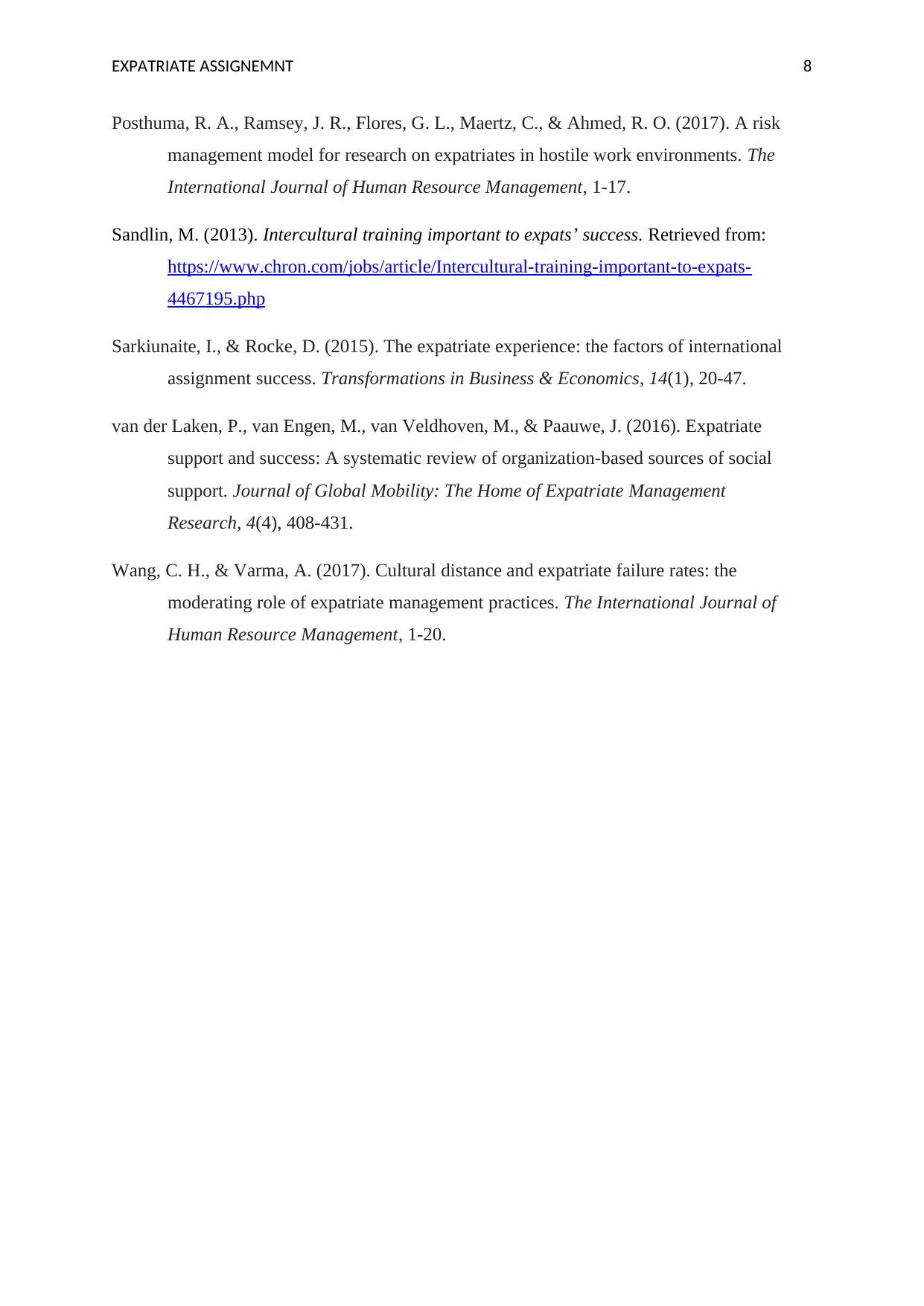
EXPATRIATE ASSIGNEMNT 8
Posthuma, R. A., Ramsey, J. R., Flores, G. L., Maertz, C., & Ahmed, R. O. (2017). A risk
management model for research on expatriates in hostile work environments. The
International Journal of Human Resource Management, 1-17.
Sandlin, M. (2013). Intercultural training important to expats’ success. Retrieved from:
https://www.chron.com/jobs/article/Intercultural-training-important-to-expats-
4467195.php
Sarkiunaite, I., & Rocke, D. (2015). The expatriate experience: the factors of international
assignment success. Transformations in Business & Economics, 14(1), 20-47.
van der Laken, P., van Engen, M., van Veldhoven, M., & Paauwe, J. (2016). Expatriate
support and success: A systematic review of organization-based sources of social
support. Journal of Global Mobility: The Home of Expatriate Management
Research, 4(4), 408-431.
Wang, C. H., & Varma, A. (2017). Cultural distance and expatriate failure rates: the
moderating role of expatriate management practices. The International Journal of
Human Resource Management, 1-20.
Posthuma, R. A., Ramsey, J. R., Flores, G. L., Maertz, C., & Ahmed, R. O. (2017). A risk
management model for research on expatriates in hostile work environments. The
International Journal of Human Resource Management, 1-17.
Sandlin, M. (2013). Intercultural training important to expats’ success. Retrieved from:
https://www.chron.com/jobs/article/Intercultural-training-important-to-expats-
4467195.php
Sarkiunaite, I., & Rocke, D. (2015). The expatriate experience: the factors of international
assignment success. Transformations in Business & Economics, 14(1), 20-47.
van der Laken, P., van Engen, M., van Veldhoven, M., & Paauwe, J. (2016). Expatriate
support and success: A systematic review of organization-based sources of social
support. Journal of Global Mobility: The Home of Expatriate Management
Research, 4(4), 408-431.
Wang, C. H., & Varma, A. (2017). Cultural distance and expatriate failure rates: the
moderating role of expatriate management practices. The International Journal of
Human Resource Management, 1-20.
⊘ This is a preview!⊘
Do you want full access?
Subscribe today to unlock all pages.

Trusted by 1+ million students worldwide
1 out of 9
Related Documents
Your All-in-One AI-Powered Toolkit for Academic Success.
+13062052269
info@desklib.com
Available 24*7 on WhatsApp / Email
![[object Object]](/_next/static/media/star-bottom.7253800d.svg)
Unlock your academic potential
Copyright © 2020–2026 A2Z Services. All Rights Reserved. Developed and managed by ZUCOL.



